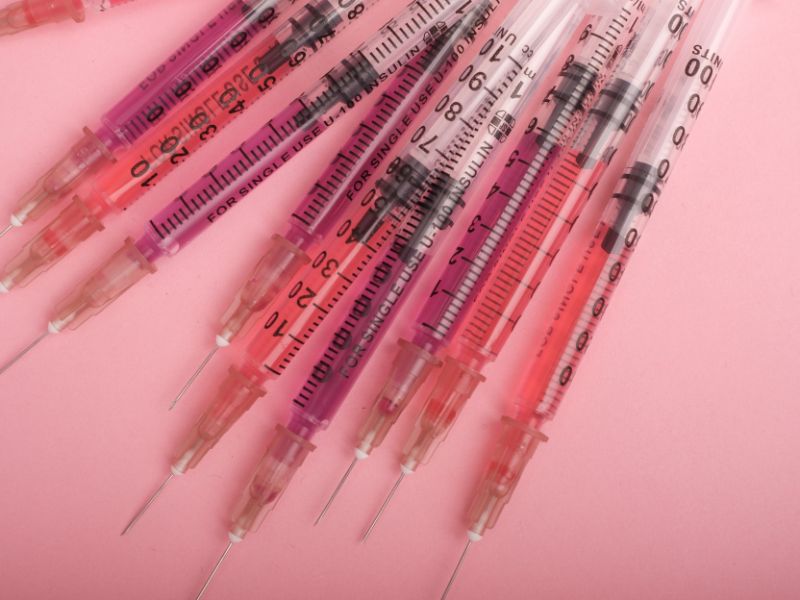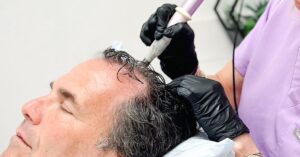Your Mitochondria Affect Aging in Many Ways
Yes, your mitochondria affect aging, too! Mitochondria are well known as the powerhouse of the cell. They are the “energy factory” of our bodies. In fact, mitochondria produce 90% of the energy our bodies need to function. This obviously means that they play important roles in many of the body\’s functions, but they have been increasingly recognized as important players in the aging process. Mitochondrial dysfunction has been identified as a primary cause of age-related decline. Many aging-related diseases, especially neurodegenerative disorders, involve these cellular organelles. Dysfunction of mitochondria also affect the immune system and skin health.
Mitochondrial dysfunction has been shown to affect:
- Skin Homeostasis
- Pigmentation Issues
- Skin Aging
- Skin Cancer
- Other Skin Diseases (that can present as hair abnormalities, inflammation, rashes, hypo- and hyperpigmentation, and acrocyanosis–i.e., blueness of extremities)
Read on to learn more about the powerful ways our mitochondria affect our skin health and our ability to age well.
Mitochondria and Skin Health
The skin is our largest organ that covers our entire body, serving as a protective shield against heat, light, injury, and infection. It is a complex structure with many different layers that regulates our body temperature, prevents water loss, and even helps to make Vitamin D when exposed to the sun. It can also be a visual indicator of our age. With aging, both the epidermis and dermis undergo thinning and lose their regenerative capacity, which manifests as wrinkling, dryness, and pigmentation issues (1).
The skin is a high turnover organ, which means that it is constantly renewing. This renewal is dependent on the rapid proliferation of its cells. And, you guessed it, the energy required for this rapid renewal comes directly from your mitochondria.
Mitochondrial respiration is what drives this renewal process. If you remember high school biology class (who doesn’t?!), the electron transport chain (ETC) generates ATP (adenosine triphosphate)–the energy needed to fuel renewal. However, during this process (which is all taking place within the mitochondria), certain chemicals are produced called reactive oxygen species (ROS). When these molecules, sometimes called “free radicals” remain unchecked by the antioxidant system, they can disrupt macromolecular and cellular structures, damaging the mitochondrial function and leading to faster aging and disease.
Facts about Mitochondria and Skin Aging:
- Skin is the largest organ with high turnover rate in the human body.
- Mitochondria play a vital role in the skin.
- Mitochondrial dysfunction induces skin aging.
- Skin disorders manifest mitochondrial dysfunction.
- Targeting mitochondria may help rejuvenate skin
Types of Skin Aging
There are two types of skin aging in which mitochondria play a role. The first is chronological skin aging, which is the intrinsic aging that happens as we move beyond our years. This is the type of aging that is inevitable and genetically determined. However, this doesn’t necessarily mean that it is something that we can’t control or improve. It’s definitely something we can worsen when we compound it with the second type of aging. Photo aging is the external aging that occurs from chronic exposure to solar UVA and UVB radiations, your lifestyle choices (like drinking alcohol, smoking, etc.) toxin exposure, etc.
Both types of aging affect the incredible protective functions of the skin. Chronological aging of the skin usually includes thinning and dryness, while photo-aging produces thicker/leathery-like skin with deeper wrinkling and pigmentation issues. Several studies have directly or indirectly linked mitochondrial dysfunction to both chronological and photo-aging of the skin (2).
See the figure below (1):
Skin aging categories: Intrinsic (internal) aging and extrinsic (external) aging. b: Skin aging is characterized by loss of membrane potential, elevated levels of ROS, DNA damage leading to nuclear and mitochondrial gene mutations, respiratory chain defect due to enzyme alterations, altered cellular regulation, and disease progression.
As you can see from the above figure, both intrinsic and extrinsic factors can affect mitochondrial function through increased ROS production (remember that these are the free radicals that disrupt the cell function) and antioxidant depletion (antioxidants are the substances that help scavenge the ROS), which leads to damage to the Mitochondrial DNA (mtDNA), \”mitophagy\” (or selective degradation of the mitochondria) and cell death.
When we are discussing mitochondria, it\’s difficult not to get very scientific. After all, we are talking about a miniscule organelle within the almost 724 trillion tiny cells within our body. But new research is continuing to show that mtDNA depletion is the underlying cause of skin aging and that restoring mitochondrial functions can restore skin youthfulness. And, the best news is that there is something we can do about our mitochondrial health.
Mitochondria and Melatonin
Many of us take a melatonin supplement to sleep well, but what does it have to do with your skin health? Melatonin is a neuro-hormone secreted by the pineal gland that regulates our circadian rhythm. It is also a powerful antioxidant that is regulated in both the hepatic (liver) and epidermal (skin) metabolism. Melatonin plays a pivotal photo-protective role in your skin, helping with wound healing, inflammation, immune response, and pigmentation. Studies have pointed to a “symbiotic” relationship between melatonin and epidermal mitochondria (3, 4). This means that melatonin both needs and helps the mitochondria to function well and vice versa.
Mitochondria affect aging, especially skin aging, because mitochondria appear to be a central hub of melatonin metabolism in the skin cells. They are indispensable for physiological skin functions and for effective protection of cutaneous homeostasis from detrimental environmental factors. The mitochondria can decrease pathological processes including cancer formation and other hyperproliferative and inflammatory conditions. Melatonin plays a protective role against UV radiation and the attendant mitochondrial dysfunction. While this is an exciting new area of research that is gaining a lot of speed in certain research communities, it doesn’t take a scientist’s mind to understand that getting enough sleep certainly helps our skin to look its best!
Mitochondria and Skin Cancer
Ok, we have to go back to ROS generation (the release of bad chemicals/free radicals when there are not enough antioxidants like melatonin to counteract their punch) and cell death. We have to do so because this mitochondrial dysfunction is implicated in almost all human cancers, including those affecting the skin.
Researchers in the journal Cell Death and Disease noted: “Congenital and somatic mutations in mtDNA have been detected in most tumors, including those affecting the skin and tumorigenic stimuli such as radiation and carcinogens are known to damage the mtDNA directly. Furthermore, mounting evidence suggests that mitochondria are involved in the interplay between oxidative stress, hypoxia and metabolic reprogramming of tumor cells” (1). In short, optimal mitochondrial function is something to strive for when it comes to your wellness efforts not only because mitochondria affect aging, but these sometimes problematic organelles can be quite destructive in the body in other detrimental ways than wrinkles.
How to Optimize Mitochondrial Health
While there is still much more research that needs to be done on the ways in which we can target mitochondria in specific skin disorders, there is no denying that mitochondria affect aging and that they play a very important role in regulating normal and abnormal skin physiology. And, there is no doubt that supporting the proper function of this cellular organelle is something that can affect your health in powerful ways. Below are some tips to help support these tiny organelles that pack a potent punch.
Is it the key to anti-aging? We’ll see. This is an hypothesis currently being worked out in research laboratories all over the world. What we know now is that optimizing your mitochondrial health is nothing but beneficial for your health, the way you look, and most importantly, the way you feel.
So, how do we optimize mitochondrial health? The following are some fantastic ways to strengthen and support these powerfully important cellular organelles.
1. Remove the Extrinsic Factors
The first way to improve your mitochondrial health is to remove the extrinsic triggers that can damage mitochondrial function:
- nutrient deficiencies
- oxidative stress
- viruses/parasites
- heavy metals
- environmental stressors, such as: organic pollutants, certain drugs, processed foods, alcohol, and smoking
- when it comes to the skin….watch your ☀️ exposure!
4. EXERCISE!
Exercise is one of the easiest and most effective ways to improve your mitochondrial health.
Sreekumaran Nair, a medical doctor and diabetes researcher at the Mayo Clinic in Rochester, Minnesota says: “Based on everything we know, there’s no substitute for these exercise programs when it comes to delaying the aging process.” (5)
However, if your energy levels are low, you may not have the drive to exercise, and more therapeutic interventions are necessary.
3. Target Your Mitochondria Therapeutically
Targeting your mitochondria therapeutically involves either boosting ATP production or increasing antioxidant levels to scavenge the excess free radicals that are released when this process is uncontrolled by an inefficient antioxidant system.
CoQ10 and Mitochondrial Health
Increasing important antioxidant levels, such as CoQ10, which plays a pivotal role in skin aging, is a dynamic way to rescue your mitochondrial from dysfunction. The antioxidant and bioenergetic roles of CoQ10 are closely associated with skin aging and other disorders. CoQ10 levels are 10-fold higher in the epidermis (the top layer of your skin) compared to the dermis and decrease significantly with age. This is why you see a lot of anti-aging skincare products with CoQ10 as the active ingredient. Topical products do have their value, but taking an inside out approach to your wellness is the most optimal path. CoQ10 Injections and supplements are two ways to better support your mitochondrial function.
Other nutrients that support mitochondrial function:
- B1, B2, B3, B5, Lipoate
- L-Carnitine
- Glutathione
- Iron
- Magnesium
- Manganese
- CoQ10
- Niacin
- Riboflavin
- Coenzyme Q10
- Vitamin C
- Vitamin K
- Alpha-Lipoic Acid
- Phosphatidylcholine
- Pantothenic Acid (B5)
Our Favorite Mitochondrial Repair Treatment
We\’re so devoted to your mitochondrial health at Tringali Vibrant Health that we have designed an IV Therapy to support this powerful and sometimes problematic organelle.
The Mitochondria Repair IV is a comprehensive IV therapy designed to repair and rescue your mitochondria for cells that need the largest amounts of energy, such as heart, brain, muscle, nerves, and your skin!. It includes and can help with all of the following:
- MAH OZONE: makes red blood cells more elastic and flexible, improves mitochondrial function and efficiency
- COQ10: protects cells by neutralizing free radicals, which reduces oxidative stress in the body
- ALPHA LIPOIC ACID: a powerful antioxidant
- B COMPLEX: produces red blood cells, supports brain function, protects your nerves, boosts energy levels
- L-CARNITINE: supports weight loss, protects the brain supports metabolic function, and athletic performance
- METHYLCOBALAMIN: helps in the synthesis of neuronal lipids, which can improve dementia, Alzheimers & Parkinsons
- MAGNESIUM CHLORIDE: supports muscles and nerves
- CALCIUM GLUCONATE: supports the regulation of ATP
- TAURINE: boosts physical performance, supports metabolism, protects musculoskeletal system and your heart, eyes and ears!
If you are ready to start optimizing your mitochondrial health, please call: 561-283-1166 to schedule an appointment for our Mitochondrial Repair IV or book a consult with me directly to talk more about how mitochondria affect aging.
In Vibrant Health,









